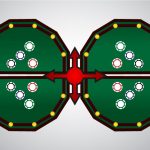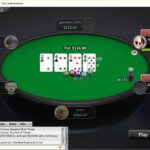After a few months of playing online poker for real money I thought it would be appropriate to summarize a few of the common mistakes that I learnt through losing my money, and I saw my friends make and I commonly see on this site.
Nothing I say here is any new and amazing stuff, and it is stuff that you will see in most Poker Books and in this site, but I still think it is valueble for new beginners to avoid those pitfalls.
My experience is mainly in SnG’s and is aimed for SnG players.
OK, enough introductions:
1. AJ, AT, KJ – Most beginners tend to overvalue those hands. In late stages in SnGs they are gold but in early stages (7-9 players) they are very dangerous hands. It is exactly the kind of hand that you either win small pots or lose big ones. In early stages I fold those hands to any aggression preflop, limp from MP, maybe raise from LP, depending on the table structure.
2. Suited connectors are for flushes or str8s – I believe that limping with suited connectors is a profitable move in SnGs – assuming you remember why you play them!
You want to make a str8 or a flush, not Top pair. Way too often you will limp with T9 to have a flop of T,7,2 rainbow – your hand is not good. You may be able to win the pot, but you have a very mediocre hand, be willing to drop it.
3. KK – This is a great hand of course, but by no means is it a guaranteed winner. When an A comes on the Flop you have to be very careful. If you raised nicely preflop and you had 1 or 2 callers there is a very good chance they are holding the A. If it is checked to you and you are last or one before last to bet throw in a continuation bet, but be willing to fold to a re-raise.
4. JJ, TT – my least favorite hands of all time – Early in the tournament I am not willing to invest too much money in them, maybe 10% of my stack. From EP I will play them as I would low pair (see the flop cheap, if you didn’t hit a set or a low flop when you have overpair fold to aggression).
5. Once you put chips in the pot they are not yours anymore – Don’t feel compelled to chase the hand just because you invested money in the pot. SnGs are not about any one specific hand – its about making it to the money.
6. Slowplay monsters only at early stages – And by monster I mean a boat, a nut flush or a set on a very uncoordinated board. Don’t slow play two pairs in the early stages, you will get burned more often then you can believe. If you have JThearts and the flop comes 2 7 9 hearts don’t let the Q, K, A hearts get a card for cheap. Make them pay to chase.
7. People can get a few good hands in a row – It is not uncommon to get 3,4 or even 5 good starting hands in a row. Just because someone raised 3 consecutive times preflop does not mean that he is a bluffing maniac, he could be, but he is not necessarily is. When he raise 7 out of the first 10 hands you can assume he is a maniac.
8. Don’t minbet at early stages- It accomplishes nothing – You will not scare anybody with a minbet when the minbet is 1/50 of their stack. If you think you should bet do it aggressively.
9. pot odds are less important than stack size – In ring games pot odds is king. In SnG your stack size matters much more. It is way too easy to bleed half your stack on chasing hands that you had pot odds to call , and then have a short stack and having the entire table picking on you trying to knock you out.
10. He is bluffing syndrome – Everybody I know had this syndrome at one point or another – You are sure everybody is bluffing all the time – so you re-raise somebody with your TPLK only to discover – surprise, surprise they have you out kicked. You need good reads to find out that people are bluffing.
11. Good players change pace – the ABC of SnG is to play tight in the beginning and aggressively towards the end – don’t be surprised when people do it. Just because somebody is playing only 2 hands in the first three orbits does not mean that they will be tight forever.
12. Don’t limp when you are short stacked – When you are the short stacked (5BB or less) you can’t limp into hands – pick your spot and try to double up.
13. Think about the entire hand – When you bet/raise/call think about the entire hand – remember what your opponent did at every stage and try to anticipate what he will do next. A poker hand is not a series of independent decisions, it is a series of connected decisions each affecting the other.
14. Notice the tight players too – It is way to easy to overlook the tight players at the table and focus on the loose/aggressive ones. Pay attention to those who fold 80% of the hands, they probably know what they are doing.
Submit your review | |







